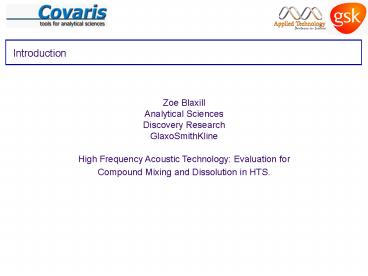BMA Laboratories - PowerPoint PPT Presentation
1 / 27
Title:
BMA Laboratories
Description:
Scalable from large tubes to 1536 well micro-plates. Highly ... Karen Dobbs CM. Todd Graybill HTC. Suzanne Baddeley AD. Liz Clark S&CP. Jim Laugharn Covaris ... – PowerPoint PPT presentation
Number of Views:59
Avg rating:3.0/5.0
Title: BMA Laboratories
1
Introduction
Zoe Blaxill Analytical Sciences Discovery
Research GlaxoSmithKline High Frequency Acoustic
Technology Evaluation for Compound Mixing and
Dissolution in HTS.
2
Introduction
- Current Issues
- Technology Overview
- Project areas
- Summary
3
Current Issues
Department
- Compound Primary Dissolution
- Freeze thaw Aliquoting
- (causing precipitation)
Compound Management High Throughput Chemistry
HTS Groups Lead Optimisation Groups Therapeutic
area Research
Compound solubility in the (uHTS) Screening assay
4
Technology Overview
Adaptive Focused Acoustics (AFA) enables
Non-contact
Isothermal
Closed vessel mixing
5
Technology overview
Frequency of AFA operation
Sonicators operate at20khz
AFA operates 500khz-1000khz
6
Technology overview
Wavelength of AFA operation
Wavelength sonicator 10cm
Wavelength AFA 1mm
7
Technology
High Frequency short wavelength acoustic
energy focusable into sample
- Non-contact
- Scalable from large tubes to 1536 well
micro-plates - Highly controllable from high to low power
- Isothermal
- Power of lithotriper (kidney stone disruption)
- Ideal for mixing homogenisation. Too powerful
to dispense (Labcyte)
8
Technology - video of Gum dissolution
Capable of dissolution in 20s that previously
would take 12 hours
9
Project Area AFA in CM HTC
Aim To Evaluate / Implement AFA in CM HTC
for Primary Dissolution of dried compounds
10
Project Areas HTC, CM Chris Lipinski paper
11
Generic Compound Store process
HTS
Primary dissolution
Sister Plate Production
Daughter Plate Production
Master Plate Production
384 Deep-well plate
Tube
2D Tube
RE-TEST
12
Project areas Compound Management HTC
- Objective maintain compound concentration from
- HTC CM uHTS (XC50 SAR)
- Compound solubility issues caused by
- Initial dissolution - glues gums etc
- Precipitation - water uptake freeze thaw
13
Project area Compound Management HTC
- Phase 1 Evaluation of AFA in CM HTC
- Analytical Sciences
- No compound degradation observed LC-MS data
- Compound Management
- From non-targeted libraries 400 difficult to
solublilise compounds were selected. Of these
85 were dissolved in 20 secs. The remainder
were converted to a fine suspension that could be
pipetted by a liquid handling robot - HTC
- Evaluated for new compound dissolution. Now used
as diagnostic for compound solubility. 20secs
under AFA treatment and if not solublised the
solvent is changed or the molecule is modified
14
Project area Compound Management HTC
- Phase 2 Implementation of AFA in CM HTC
- Requirement
- Fully automated, High throughput, High capacity
robot incorporating AFA technology for primary
dissolution of all compounds - Capable of AFA treatment of tubes, vials
microwell plates - All tubes etc. must be dry post AFA treatment
(samples need to be partially immersed into water
for AFA treatment) - Ability to handle both closed and open tubes
- Software capable of work-list operation for
integration into LIMS
GSK commissioned development of Covaris C2000
with Covaris KBiosciences
15
Application area Compound Management HTC
Objective Automated primary dissolution of
compounds C2000 Ability Rapid dissolution
? Integratable ? Compounds to thermodynamic
equilibrium ?
Status Currently installing in US. UK complete
16
C2000 automated acoustic dissolution
17
Application area Compound Management HTC
- Future
- Implementation of AFA for thawing and mixing of
2D barcode tubes on C2000
18
Project Area uHTS
Aim to evaluate AFA in uHTS assays
19
Amphora paper
20
Project Area AFA in uHTS
Objective Evaluate AFA effects in assay
quality/data compound solubility Preliminary
Areas of desired benefit Improve Z Reduce
CV Re-solublising compound in aqueous Accelerate
assays
21
Application areas AFA in uHTS
Technology Current on the market AFA products
incorporate a point source - One well at a
time Primary evaluation ongoing
incorporating instrument that produces acoustic
energy in a line - A column of wells at a time
(30/60 secs for a plate)
22
Project area uHTS - 1536 plate mixing video
23
Application areas uHTS preliminary data
Assay acceleration Data showing the effect of
acoustic mixing a 1536 well HTS assay on signal
window Over time. Note acoustic mixing
accelerates assay
24
Application areas uHTS preliminary data
Assay variability Data showing the effect of
acoustic mixing a 1536 well HTS assay on assay
variability (Z) over time. Note acoustic
mixing significantly decreases assay variability
25
Application areas uHTS preliminary conclusion
Positive data AFA treatment of an uHTS assay
results in a number of beneficial effects -
lower variability - increased speed -
decreased false positives (data not shown)
- Future work required
- Aid in specification of HTS suitable instrument
with Covaris / KBiosciences - Conduct more assays
- Evaluate effect of AFA treatment on compound
solubility of aqueous HTS assay
26
Further AFA usage in GSK Application areas
- High-throughput screening
- Compound Dissolution and Resolution
- Cell Lysis Mammalian, Insect, E-coli, plant
- Continuous flow processing
- High Throughput Chemistry
- Drug Metabolism and Pharmacokinetics
- RNA extraction - Homogenisation of biological
tissue - Tissue homogenisation for Proteomic studies
27
The end questions
- Many thanks to
- Jon Curtis ATG
- Jim Chan CM
- Ken Murray CM
- Karen Dobbs CM
- Todd Graybill HTC
- Suzanne Baddeley AD
- Liz Clark SCP
- Jim Laugharn Covaris
- Phil Robinson KBioscience

